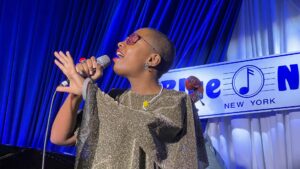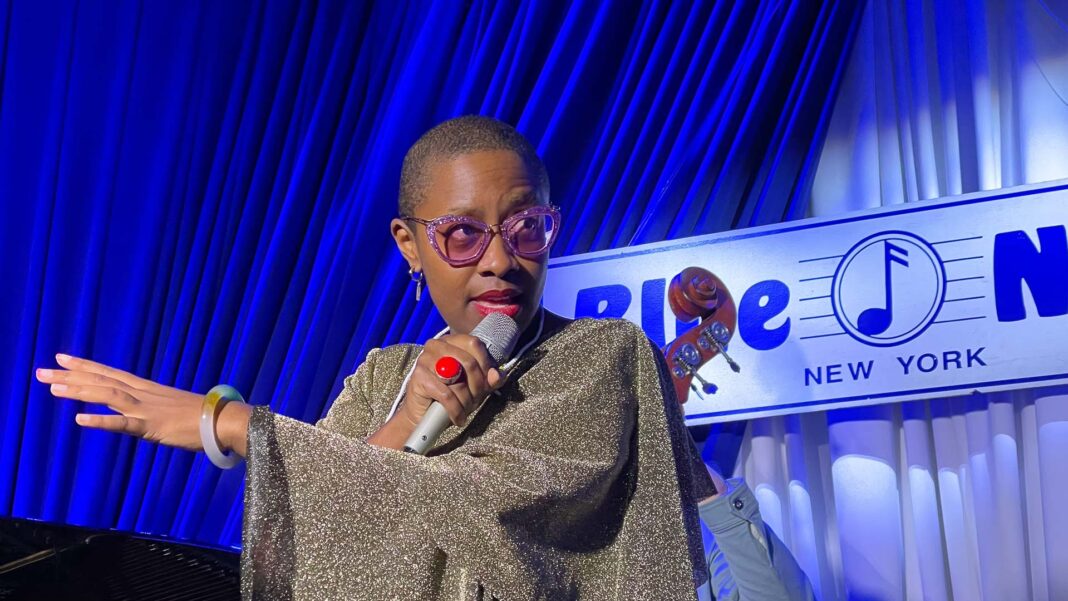
THIS IS THE FOURTH OF OUR BEST OF 23 REVIEW OF INTERVIEWS: If you’ve been following Cultural Attaché for even a small amount of time, you know how much I love singer Cécile McLorin Salvant. We’re happy to say we finally have an interview with this three-time Grammy Award winner (who also happens to have a nomination for Best Jazz Vocal Album for her most recent release, Ghost Song)!
Those three Grammy Awards came for three albums in a row: For One to Love, Dreams and Daggers and The Window. Might it be four-in-a-row? The New York Times called it “her most revealing and rewarding album yet.” I love the album and had the privilege of seeing Salvant in back-to-back performances at the Blue Note in New York City in September. Salvant is truly a once-in-a-generation artist.
She is currently on tour across the United States. Her next show is at Royce Hall on Thursday, January 26th as part of CAP UCLA’s season. She’ll be at the Mondavi Center in Davis on January 27th; Bing Concert Hall at Stanford on January 28th; the Stewart Theatre in Raleigh, NC on February 2nd and Knight Concert Hall in Miami on February 3rd (where her special guest is the Christian Sands Trio).
For her full itinerary, please go here.
Here is my interview with Salvant which was conducted via e-mail.
During the pandemic you were reading Marcel Proust, particularly In Search of Lost Time. In the fifth volume he writes, “The only true voyage of discovery, the only fountain of Eternal Youth, would be not to visit strange lands but to possess other eyes, to behold the universe through the eyes of another, of a hundred others, to behold the hundred universes that each of them beholds, that each of them is..” Do you agree with him and how does that perspective align itself with how you choose, hear and perform music?
I love that quote!!!! Beautiful. I absolutely agree with this.
The pandemic negated the opportunity for LA audiences to see and hear Ogresse. What does the future hold for that work and will you record it or turn it into a fully produced musical/show?
We’re making it into an animated feature length film. It’s already recorded but we’re animating it now with a team in Europe. [Salvant will be performing Ogresse on February 24th and 25th at the Walker Art Center in Milwaukee.]
Five years ago you gave an interview to ArtsDesk.com where you said, “Visual art is the most important thing to me.” At that time you weren’t sure if that passion for visual arts influenced your music adding, “probably, but not in a way that I can tell.” Has your perspective on that changed since 2018? Do works like Ogresse and/or the art that Nonesuch released with Ghost Song provide examples of some blending of your passions?
Yes! My perspective often changes though! Lately I’ve been trying to approach making music with the same playfulness I feel when I draw.
I first became aware of you when Bryan Ferry closed for you at the Hollywood Bowl in August of 2017. It’s a night I won’t ever forget. I’ve since seen you at much smaller venues. What role does a given venue play in the concerts you give?
My favorite venues to play are clubs! I like to be really close to a small packed audience. I want it to feel like I’m spilling secrets. But it’s always exhilarating and a little bit scary to be in front of a vast crowd like at the Hollywood Bowl!
Sometimes Aaron Diehl is your pianist and other times it is Sullivan Fortner. What does each pianist bring to you and your music? Are there tangible differences for you that influence the way you make music and present it live with each of them?
There are a few others I’ve been playing with over the years. Everyone adds different elements and colors to the music, they bring their tastes, their approaches even their feel to it. It’s the same with every instrument in the band. I often unknowingly pick my repertoire based on who’s playing.
In the concerts I’ve attended there seems to be a semblance of spontaneity in the set lists. What role does fluidity play in each performance? How much does an audience play a role in what you choose to sing at a given concert?
That’s another that changes based on the band. If I’m playing duo with Sullivan there’s often no setlist and it really depends on the moment. The audience plays a bit of a role if they choose to! Some audiences feel quiet, or more reserved. They play less of a role. When they participate a bit more, are reactive, they play a much bigger role to where the set will go.
Music from Broadway musicals used to top the record charts. It’s been a long time since that happened. Yet your passion for musicals is undeniable. The first song on your first album, Cécile, comes from an obscure 1930 musical, Lew Leslie’s International Revue (Exactly Like You). You seem almost childlike in your appreciation for these songs. How and when did that passion for get ignited in you and what role will that material play as you move forward throughout your career?
I’m not sure it’s a childlike quality, it’s more that I love theater and acting. I love operas too, which to me aren’t much different from musicals. I love songs that flow from a character dealing with a specific context.
Like pianist Brad Mehldau and others, you had a background in classical music but switched to jazz (though I heard you sing Baroque music at the Blue Note in NY in September). How does your classical background inform your approach to jazz?

This is a tough question to answer because I try to get away from genres. Genres like jazz and classical are too broad in my opinion. Jazz is extremely fragmented, it encompasses so much different music. Even baroque and early music have such fragmented, different styles within them. There were differences in the music based on cities! Even tuning was based on location.
I think everything I’ve studied informs what I do in some way. In conservatory, I got to learn the aria Medea sings when she goes back and forth between wanting to kill her children for vengeance and wanting to protect them. I think learning that and other songs, learning a bit about baroque dance, studying tap dance for a month in high school, learning the basics of reading figured bass on a harpsichord, all this informs my desire to find a way to approach music in a more open way, with less boundaries.
Your mother has described you as an intellectual (The New Yorker 2017). You’ve talked a lot about your instincts. How and where do your instincts meet up with your intellect and vice-versa?
I don’t identify as an intellectual! I can be a nerd for the things that I love. And I study and research and learn about the history of those things. But following my instincts is very important to me. Sometimes too much research can get in the way of that.
In an interview with Ethan Iverson you bring up a point, this was in relation to Bessie Smith, where you said, “at first I guess it sounds very the same when you don’t know how to listen.” What is the audience responsibility in listening? How much does technology and the need for videos and photos get in the way of your ability to communicate with an audience and their ability to listen? Is the fine art of listening a dying art?
It’s changing the way we communicate. We have more access than ever to all kinds of music and yet our attention span is very low. But I think people are feeling a bit over-saturated so there might be a countercurrent to that soon. I also really admire the way this younger generation coming up can find whatever they connect with, regardless of era or popularity, online. Listening will have to change whether we like it or not! But it’s always been changing. It changed already when the first compositions were notated on paper, when people began having access to records, when music videos started to gain popularity, and so on.
Nonesuch Records alluded in an email last week to a new album coming out this spring. What can you tell me about this new recording?
It will be all in French! About a half woman half snake.
If you could talk to the teenager who had a mohawk, was listening to Dave Matthews Band and Soundgarden before moving to France, what would you say to her about the artist you’ve become and the artist you want to be as you move forward in your career?
I probably wouldn’t say anything about that if I could talk to the teenager I was!!
I’d probably just stare. But I’ll say to you that I feel really lucky for everything that I’ve been able to do, and I’m very excited to keep making my arts and crafts, which is how I like to think of what I do (otherwise you get too precious about it all).
Main Photo: Cécile McLorin Salvant at the Blue Note in New York (Photo by Craig L. Byrd)











